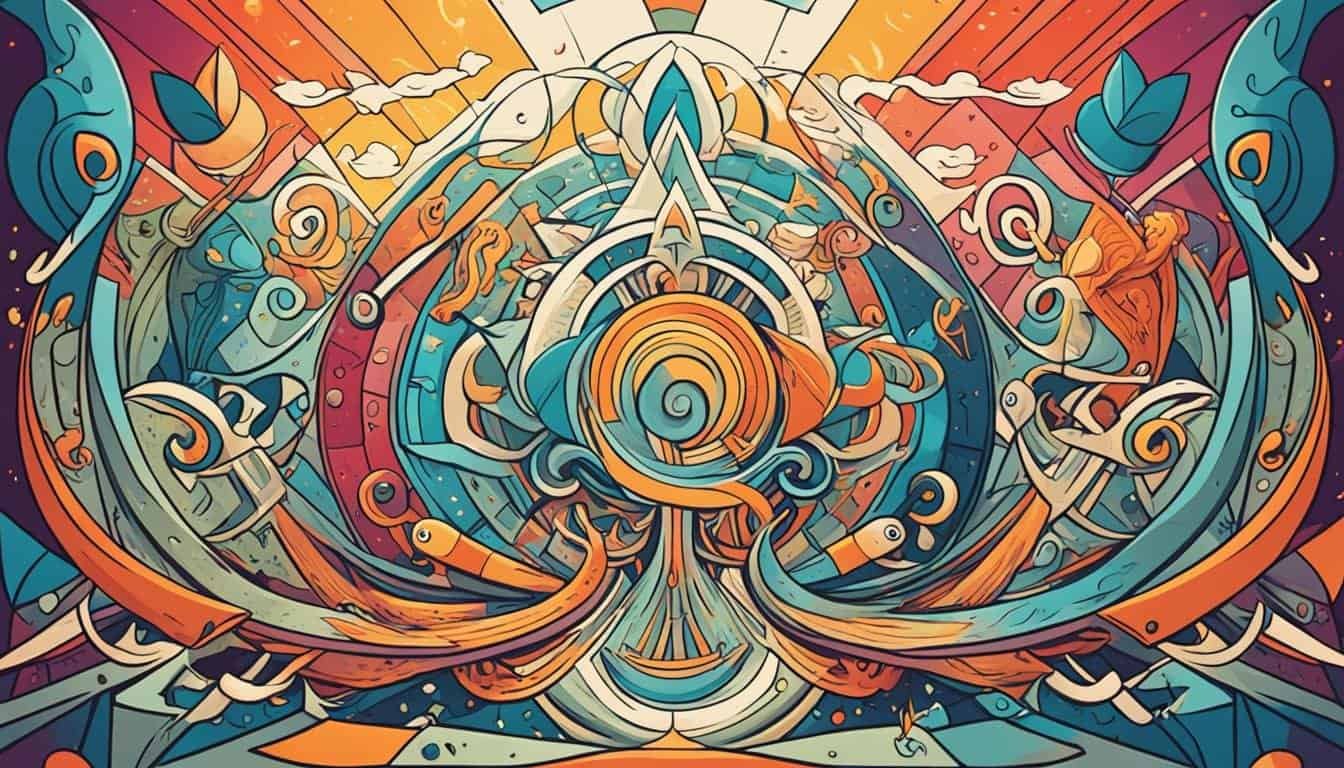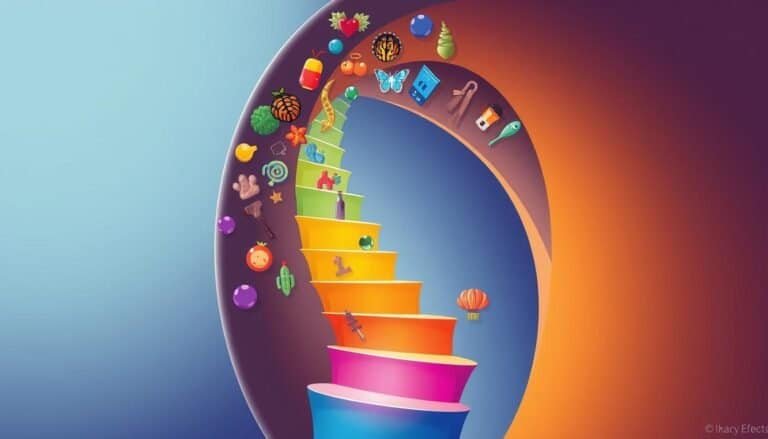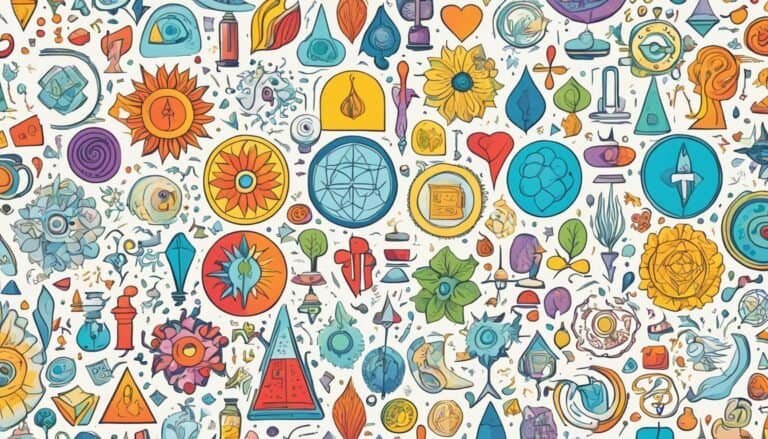Exploring Mythology in Psychology: Insights & Themes
“The psychological myths we live by are perhaps as powerful as the myths we inherited from our ancestors.” – Carl Jung
Psychomythology, the study of the effects of mythological narratives on human psychology, has emerged as a fascinating field of exploration. It delves into the intertwined relationship between mythology and psychology, revealing profound insights into the human psyche. Mythology has influenced psychological beliefs, archetypes, and symbolism, while psychology offers interpretations and understanding of mythological narratives.
By examining the psychological aspects of mythology, we gain a deeper understanding of the human mind and behavior. From ancient myths to contemporary interpretations, the diverse dimensions of mythology provide rich material for psychological exploration. Let us embark on a journey through the realms of psychology and mythology, unraveling the hidden depths of the human psyche.
Key Takeaways
- Psychomythology explores the effects of mythological narratives on human psychology.
- Myths are powerful psychological stories that shape beliefs, archetypes, and symbolism.
- Psychology offers interpretations and insights into the psychological aspects of mythology.
- Understanding the psychology of mythology provides a deeper understanding of the human psyche.
- Exploring the interplay of psychology and mythology uncovers hidden depths of human behavior and thought.
What is Mythology and Myths?
Mythology is a collection of stories that depict a society’s beliefs, values, and culture. These stories, known as myths, serve as a means through which people try to understand the world, express themselves, and convey their beliefs.
Myths often feature fictional characters, monsters, and other fantastic elements that captivate the imagination. They offer a rich tapestry for exploring thoughts, feelings, and behavior, allowing individuals to make sense of themselves and the world around them.
At the core, mythology is a reflection of the human experience. It encompasses stories that speak to our deepest understanding of the human psyche, providing insights into our beliefs, values, and cultural identity.
Mythology is not just a collection of stories; it is a medium through which we explore our understanding of the world, express our deepest emotions, and navigate the complexities of human behavior.
Examples of Mythological Elements
Mythological stories are rich with fictional characters, monsters, and fantastic elements that add depth and intrigue. Here are some examples:
| Mythological Elements | Description |
|---|---|
| Fictional Characters | Heroes, gods, goddesses, and mythical creatures that embody specific traits and values. |
| Monsters | Legendary creatures that often symbolize the embodiment of fears or challenges. |
| Fantastic Elements | Magical artifacts, enchanted lands, and supernatural phenomena that add enchantment and wonder. |
These mythological elements spark curiosity and captivate our imagination, allowing us to explore the depths of our thoughts, feelings, and behavior.
Similarities Between Mythology and Psychology
Psychology and mythology share many similarities, as they both delve into the intricacies of the human mind and its innermost thoughts. Mythology, through its ancient stories and legends, explores the depths of human desires and motivations, just as psychology seeks to understand the psychological motivations behind human actions. Both fields recognize the significance of unconscious processes in shaping human behavior and delve into the concept of archetypes – universal symbols and motifs that reside within the collective unconscious.
By examining the similarities between psychology and mythology, we can gain valuable insights into the human psyche and the universal symbols that shape our understanding of the world.
Similarities in Psychology and Mythology
- Exploration of the Human Mind: Both psychology and mythology seek to understand the complexities of the human mind and how our thoughts and beliefs influence behavior.
- Innermost Thoughts and Desires: Mythological stories delve into the innermost thoughts and desires of humans, while psychology aims to uncover the psychological motivations behind human actions.
- Importance of Unconscious Processes: Both fields recognize the role of unconscious processes in shaping human behavior and how they influence our thoughts, emotions, and actions.
- Exploration of Archetypes: Psychology and mythology both explore the concept of archetypes, which are universal symbols and motifs present in the collective unconscious.
To illustrate this further, let’s look at a table showcasing the similarities between psychology and mythology:
| Psychology | Mythology |
|---|---|
| Explores the human mind and behavior | Explores the human mind and desires |
| Studies psychological motivations | Reveals psychological motivations through stories |
| Recognizes the importance of unconscious processes | Delves into the unconscious mind |
| Examines archetypes and universal symbols | Utilizes archetypes and symbols in narratives |
Differences Between Mythology and Psychology
While psychology and mythology may share some similarities, there are important differences that distinguish these two fields. Psychology is a scientific discipline that focuses on the study of the human mind through empirical research and objective evidence. On the other hand, mythology is a form of storytelling that is not based on scientific evidence.
Psychology delves into the complexities of the human mind, drawing on rigorous research methods to uncover the workings of the conscious and unconscious mind. It explores various aspects of the human psyche, including cognition, behavior, emotions, and mental processes. Through empirical studies and experiments, psychology aims to provide objective insights into the human mind and improve mental health.
Mythology, on the other hand, is a rich tapestry of cultural narratives and stories that have been passed down through generations. It serves as a means of entertainment, edification, and explanation of natural phenomena. Mythological tales often feature gods, heroes, and symbolic figures that represent archetypes and universal themes relevant to the human experience.
Pyschology Mythology Study of the human mind Scientific discipline Empirical research Objective evidence Unconscious mind Archetypes Storytelling Cultural narratives
Psychology has a more recent and comprehensive body of research, employing empirical methods to uncover objective evidence about the human mind. In contrast, mythology draws from ancient stories and cultural narratives, relying on the power of storytelling to convey meaning and understanding.
Another distinction between psychology and mythology lies in their respective approaches to understanding the human mind. Psychology relies on scientific methodologies, such as experimental research, surveys, and case studies, to explore the intricacies of human behavior and the underlying mechanisms. It seeks to provide a systematic and evidence-based understanding of the human mind and behavior.
Mythology, on the other hand, explores the human psyche through symbolism, archetypes, and storytelling. It taps into the collective unconscious, delving into universal themes and motifs that resonate across cultures and time periods. Mythological narratives offer insights into human nature, values, and beliefs, providing a framework through which individuals can relate to and make sense of their own experiences.
In summary, psychology and mythology differ in their methodologies, objectives, and sources of knowledge. Psychology is a scientific discipline that strives for empirical evidence and a comprehensive understanding of the human mind. On the other hand, mythology utilizes storytelling and cultural narratives to convey meaning and explore the depths of the human psyche.
| Psychology | Mythology |
|---|---|
| Scientific discipline | Form of storytelling |
| Relies on empirical research | Relies on cultural narratives |
| Objective evidence-based approach | Interpretive and symbolic approach |
| Focuses on the study of the human mind | Explores cultural beliefs and values |
| Aims to improve mental health | Serves as a means of entertainment and explanation |
Psychomythological Approaches and Theories
In the study of psychomythology, various approaches and theories are employed to delve into the depths of mythology. These approaches aim to unravel the intricate connections between mythology and the human psyche, providing valuable insights into our beliefs, behaviors, and the forces that shape our world.
One prominent approach is the allegorical theory, which seeks to establish symbolic connections between mythological narratives and human experiences. It explores the idea that myths convey deeper meanings and psychological truths through their stories and characters. By deciphering these symbols, psychologists can gain a deeper understanding of human behavior and thought processes.
The symbolic theory focuses on the reflection of human behavior and thoughts through symbolic representations in mythology. Symbols are potent tools for expressing abstract concepts and complex emotions, providing a visual language to interpret our innermost desires and fears. By analyzing ancient symbols found in mythological tales, psychologists can gain insights into the unconscious realm of the human psyche.
The rational theory explores the misunderstandings that give rise to mythological stories. It underscores the notion that myths often originate from attempts to explain natural phenomena, cultural practices, and historical events that were not fully understood at the time. By examining these misconceptions, psychologists can uncover the underlying psychological processes that shape our understanding of the world.
The convergence theory suggests that people are deified in myths, emphasizing the human desire to attribute divine qualities to extraordinary individuals. This theory explores the psychological need for role models and the tendency to elevate certain individuals or heroic figures to the realm of gods and goddesses.
The nature theory examines the relationship between mythology and meteorological and cosmological events. It explores how myths, through their representation of natural forces, reflect human fascination with the awe-inspiring power of nature. By studying these ancient stories, psychologists can gain insights into our ongoing fascination with the forces of nature and its impact on human behavior.
The ritual theory examines the role of rituals in mythology and their psychological significance. Rituals, often accompanied by symbolic actions and gestures, play a vital role in religious and cultural practices. By analyzing the rituals depicted in mythological tales, psychologists can gain insights into the psychological aspects of human behavior and the role of symbolic actions in personal and collective transformation.
These diverse psychomythological approaches shed light on the ancient symbols, rituals, and narratives that continue to influence our visual arts, behaviors, and identities. By studying mythology through a psychological lens, we can deepen our understanding of the universal human experience and the profound impact of myths on our collective consciousness.
Psychomythological Approaches and Theories Table
| Approach/Theory | Description |
|---|---|
| Allegorical Theory | Establishes symbolic connections between mythological narratives and human experiences. |
| Symbolic Theory | Studies the reflection of human behavior and thoughts through symbolic representations in mythology. |
| Rational Theory | Explores the misunderstandings that give rise to mythological stories. |
| Convergence Theory | Suggests that people are deified in myths, emphasizing the human desire to attribute divine qualities to extraordinary individuals. |
| Nature Theory | Examines the relationship between mythology and meteorological and cosmological events. |
| Ritual Theory | Examines the role of rituals in mythology and their psychological significance. |
These psychomythological approaches and theories provide a rich framework for unraveling the profound influence of ancient symbols, rituals, and narratives on human behavior and the exploration of our innermost thoughts and emotions.
Mythology: A Timeless Mirror
Mythology serves as a timeless mirror of human beliefs, values, and culture. Mythology encompasses stories, symbols, and archetypes that tap into the collective unconscious, the deepest layers of the human psyche. These myths reflect the ways in which people express themselves, understand the world, and convey their beliefs. Mythological stories often contain gods, monsters, and heroes and offer insights into the human psyche and its influences.
Mythology is a rich repository of timeless tales that transcend time and culture.
The power of mythology lies in its ability to capture universal truths and timeless themes. These stories, passed down through generations, have become a part of our collective consciousness, shaping our understanding of the world and ourselves. They provide a framework through which we can explore the intricacies of the human experience, offering guidance, inspiration, and lessons that resonate across cultures and generations.
In mythology, we find symbols and archetypes that are woven into the fabric of our cultural narratives. These symbols represent deep-seated aspects of the human psyche, reflecting our inherent desires, fears, and aspirations. They speak to the core of what it means to be human, exploring themes of love, power, identity, and the eternal struggle between good and evil.
The Collective Unconscious and Symbolic Language
Carl Jung, a prominent psychologist, introduced the concept of the collective unconscious – a reservoir of shared experiences and inherited knowledge that shapes our behavior and beliefs. Within the collective unconscious, mythological symbols and archetypes reside, acting as a bridge between the conscious and unconscious realms of the human mind.
Mythology employs a symbolic language that speaks directly to the depths of our psyche. These symbols bypass rational thought and tap into our emotions and intuition, igniting a profound understanding and connection to the stories being told. Whether it’s the courageous hero, the wise mentor, or the treacherous villain, these archetypes resonate with us on a deep level, reflecting aspects of ourselves and the human condition.
Just as a mirror reflects our physical appearance, mythology serves as a mirror of our inner world – our beliefs, values, and cultural identity. It enables us to explore the vast landscapes of the human psyche and understand our place within the tapestry of existence. Through mythology, we uncover profound insights into the timeless themes that shape our lives and discover the threads that connect us to our shared humanity.
Beliefs, Values, and Cultural Significance
Mythology is deeply intertwined with our beliefs, values, and cultural traditions. It provides a narrative framework through which we interpret the world, understand morality, and make sense of the mysteries of life. These stories capture the essence of a culture and capture their fundamental beliefs and values, offering guidance and wisdom.
Across different cultures, mythology reflects the unique perspectives and experiences of a society. It offers insight into their rituals, customs, and societal structures, shedding light on the collective understanding of what is sacred, important, and revered.
Mythological Symbols in Different Cultures
| Mythological Symbol | Culture |
|---|---|
| The Phoenix | Ancient Egypt |
| The Dragon | Chinese |
| The Thunderbird | Native American |
| The Tree of Life | Norse |
These mythological symbols hold deep cultural significance and continue to resonate with people around the world. They remind us of our shared humanity and the enduring power of mythological narratives.
Mythology, with its timeless tales and archetypal symbols, offers a window into the human experience. It transcends time and culture, revealing the universal themes and truths that connect us all. By delving into mythology, we gain insight into our collective heritage, our individual journeys, and the intricate tapestry of human beliefs, values, and culture.
Depth Psychology: Navigating the Unconscious
Depth psychology takes us on a journey into the hidden layers of the human psyche, going beyond the surface-level conscious mind. It seeks to explore the depths of the unconscious, where repressed memories, unresolved conflicts, and deep-seated desires reside.
The unconscious mind communicates in mysterious ways, often through dreams, fantasies, and symbolic language. It is a language that mythology readily speaks, offering a rich tapestry of archetypal symbols and narratives that mirror our innermost experiences and struggles.
The exploration of depth psychology allows us to navigate the vast landscapes of the unconscious and uncover the mysteries of psychological development. By delving into the hidden layers of the human psyche, we gain a deeper understanding of ourselves and the forces that shape our thoughts, emotions, and behaviors.
“The unconscious is like a hidden treasure trove, waiting to be discovered. It holds the key to our deepest fears, desires, and motivations. Through depth psychology, we can unlock the hidden treasures within ourselves and embark on a journey of self-discovery and personal growth.” – Carl Jung
In the realm of depth psychology, dreams become windows into the unconscious, providing glimpses of our innermost thoughts and emotions. Fantasies offer a gateway to explore the realms of possibility and desire that lie beneath our conscious awareness. Symbolic language becomes the bridge that connects the conscious and unconscious, allowing us to decipher the messages hidden within our psyche.
Psychological development is a complex process, influenced by the interplay between the conscious and unconscious mind. Depth psychology offers valuable insights into this developmental journey, shedding light on the role of the unconscious in shaping our thoughts, emotions, and behaviors. By navigating the hidden layers of the psyche, we can uncover the underlying patterns and dynamics that contribute to our personal growth and well-being.
Exploring the Depths: Dreams and Symbolic Language
Dreams serve as a gateway to the unconscious, providing a glimpse into our deepest desires, fears, and unresolved conflicts. They can offer valuable insights and guidance for our personal development and healing. Through dream analysis, depth psychology helps us decode the symbols and metaphors embedded in our dreams, revealing the hidden messages and meanings that the unconscious is trying to communicate.
Symbolic language is another powerful tool in the realm of depth psychology. It allows us to tap into the universal symbols and archetypes that reside within the collective unconscious. By exploring the symbolic language present in myths, fairy tales, and cultural narratives, we gain a deeper understanding of ourselves and our place in the world. Symbols connect us to something beyond the tangible, stirring our emotions and provoking profound insights.
A Journey of Self-Discovery and Healing
Depth psychology invites us to embark on a journey of self-discovery and healing, guiding us through the uncharted territories of our unconscious mind. Through exploration and understanding, we integrate the hidden aspects of ourselves, embracing our shadows and finding wholeness.
By unraveling the mysteries of the unconscious, depth psychology offers a path towards personal growth, self-acceptance, and transformation. It illuminates the depths of our being and empowers us to confront our inner struggles and conflicts, leading to a greater sense of authenticity and fulfillment.
| Symbols | Meanings |
|---|---|
| Water | Unconscious mind, emotions, intuition |
| Snake | Transformation, rebirth, healing |
| Tree | Life, growth, rootedness, spiritual connection |
| Maze | Complexity, confusion, the journey of self-discovery |
Mythology and Depth Psychology: A Symbiotic Relationship
Mythology and depth psychology share a symbiotic relationship, as they both delve into the depths of the human psyche and offer profound insights into our inner world. In depth psychology, mythology serves as a powerful language of the unconscious mind, allowing individuals to tap into the rich symbolism and narratives found in myths.
The symbols and stories found in mythology often mirror the inner struggles, conflicts, and emotional challenges that individuals face in their personal lives. These mythical narratives provide a framework through which we can explore and understand our own experiences. By engaging with mythology, we can gain access to the symbolic realm of our unconscious and obtain valuable insights into our emotional and psychological landscapes.
Depth psychology utilizes the insights from mythology to guide individuals on a transformative journey of self-discovery and personal growth. By examining the archetypal themes and motifs present in myths, individuals can gain a deeper understanding of their own psyche and navigate their inner world with greater awareness.
The healing potential of mythology in depth psychology cannot be understated. By exploring the stories and symbols that resonate with us on a deep level, we can unravel unresolved emotions, process past traumas, and find inner healing. Mythological narratives offer a unique perspective that invites us to explore our own stories and find meaning in our experiences.
| Key Elements | Role in Depth Psychology |
|---|---|
| Symbols | Provide a language for the unconscious mind and represent complex psychological concepts. |
| Narratives | Reflect inner struggles, conflicts, and emotional challenges, guiding individuals on a path of self-discovery. |
| Inner Struggles | Reflect our own inner conflicts and offer insights into our psychological landscape. |
| Personal Growth | Engaging with mythology helps individuals expand their consciousness and embark on a journey of personal growth. |
| Healing | By exploring mythological narratives, individuals can find healing and gain a greater understanding of themselves. |
By intertwining mythology and depth psychology, we open ourselves up to a world of exploration, understanding, and transformation. These two domains offer valuable tools for navigating the complexities of our inner lives and embarking on a journey of self-discovery. Through the wisdom of mythology and the insights of depth psychology, we can unlock the hidden depths of our psyche and embark on a profound path of healing, growth, and self-realization.
Conclusion
The intertwining of mythology and psychology yields profound insights into the intricacies of the human psyche. Mythology, as a universal language, speaks to the depths of the unconscious, while psychology utilizes this language to guide individuals on a transformative journey of self-discovery and personal growth.
By exploring the study of mythology in psychology, we gain a deeper understanding of archetypal patterns, symbolism, and the collective unconscious. This multidimensional perspective offers a rich tapestry for comprehending and navigating the complexities of psychological development, allowing individuals to unlock their full potential.
By embracing the wisdom derived from both mythology and psychology, individuals embark on a quest to better understand themselves and unravel the mysteries of the human mind. This synergistic relationship fosters self-discovery and paves the way for personal growth, empowering individuals to embark on a lifelong journey of psychological exploration and self-actualization.
FAQ
What is psychomythology?
Psychomythology is the study of how mythological narratives and symbolism influence human psychology. It explores the relationship between mythology and human behavior, revealing insights into the human psyche.
What is mythology?
Mythology refers to a collection of stories that depict a society’s beliefs, values, and culture. These stories often contain fictional characters, monsters, and fantastic elements, serving as a means through which people explore their thoughts, feelings, and behavior, and try to make sense of themselves and the world.
What are the similarities between mythology and psychology?
Both mythology and psychology explore the human mind and its workings. They recognize the importance of unconscious processes and explore the concept of archetypes, which are universal symbols and motifs present in the collective unconscious.
What are the differences between mythology and psychology?
Psychology is a scientific discipline that relies on empirical research and objective evidence, while mythology is a form of storytelling that is not based on scientific evidence. Psychology aims to improve mental health, while mythology serves as a means of entertainment and explanation of natural phenomena.
What are the psychomythological approaches and theories?
Psychomythology employs various approaches and theories including the allegorical theory, symbolic theory, rational theory, convergence theory, nature theory, and ritual theory. These approaches explore the symbolic connections, reflection of human behavior, misunderstandings, deification, relationship with forces of nature, and the role of rituals in mythology.
How does mythology serve as a timeless mirror?
Mythology encompasses stories, symbols, and archetypes that tap into the collective unconscious, reflecting human beliefs, values, and culture. These myths offer insights into the human psyche and its influences in the ways people express themselves, understand the world, and convey their beliefs.
What is depth psychology?
Depth psychology delves into the hidden layers of the human psyche, exploring the role of the unconscious mind, which stores repressed memories, unresolved conflicts, and deep-seated desires. It seeks to navigate the unconscious and uncover the mysteries of psychological development.
How does mythology relate to depth psychology?
Mythology serves as a language of the unconscious mind in depth psychology. The symbols and narratives found in myths mirror the inner struggles, conflicts, and emotional challenges that individuals face in their personal lives, providing insights into their emotional and psychological landscapes.
How do mythology and psychology intertwine?
The intertwining of mythology and psychology offers profound insights into the human psyche. Mythology serves as a universal language that speaks to the depths of the unconscious, while psychology uses this language to guide individuals on a journey of self-discovery and personal growth.







